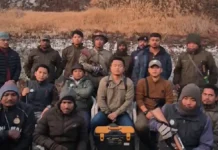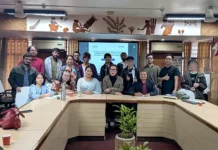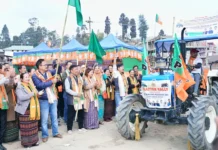[ Karyir Riba ]
ROING, 17 Sep: Reh, a book on the ethnography of the Idu-Mishmi shamanic ritualistic festival, authored by Dr Razzeko Delley, was released at an event organised by the Idu-Mishmi Cultural and Literary Society (IMCLS) here on Sunday.
This is the third book of the IMCLS publication on Idu-Mishmi shamanic culture.
The book was released by former CM Mukut Mithi.
“It is an achievement which is not very easy to attain,” he said, congratulating
the author. “Not only our own people, but other communities can also learn about us through such books that focus on our cultural aspects,” he added.
Speaking about the book, Delley said, “Reh, the grandest ritual of the Idu-Mishmis manifests myriad cultural ethos of the tribe. The ritual is rooted in Idu-Mishmi religious principles and incorporates various components of the tribe’s belief system. Reh is a wellbeing ritual that transcends the human world and its implications diverge into the spiritual realm. The ritual safeguards the people in the mundane world, as well as in the afterworld. Every aspect of Idu-Mishmi life is imbibed in the ritual. Reh being a shamanic ritual, the shamans, called igu, play the most crucial role in solemnising the ritual. The thematic aspects of Reh can be broadly classified into spiritual and social dimensions. The significance of the ritual can only be comprehended by getting into the core belief systems of the tribe. The book looks at all the components and dimensions of Reh, especially the shamanic aspects.”
He thanked all those who supported the work, and the shamans of the community for sustaining the age-old tradition.
The research project was funded by Dimapur (Nagaland)-based North East Zone Cultural Centre, and published by the Committee for Sustenance and Documentation of Idu-Mishmi Culture, a subcommittee of the IMCLS.
On the occasion, weavers of the community who underwent a two-month-long training programme on two-shaft handloom and aetondre (Idu-Mishmi war coat), under the banner of SHG IMCLS ZOH Weavers, were awarded certificates and honorarium.
IMCLS ZOH Weavers chairperson Athupi Aprawe spoke about the SHG and said, “The SHG, which was formed after the Idu-Mishmi textile achieved its GI tag, has been working relentlessly to promote our textile in every stage possible, be it in the state, national, or international level. Our weavers have represented us at all possible platforms, while also learning and gaining experience during the process.”
IMCLS ZOH weaver Ruma Linggi shared her experience of representing the SHG at the G20 summit. “We were very well appreciated, and at the same time we also received important feedback like making changes in the material being used, and to improve the quality of stitching,” she said.
Aprawe informed that these feedbacks were taken into consideration and steps were taken to change the material to cotton yarn, in order to make the clothing more comfortable for different climatic conditions.
“We approached the Lower Dibang Valley deputy commissioner, and she complied with our request for a training programme. It was organised by the DA and the district textile and industries department under the CSR programme of the Powergrid,” she said.
Aprawe urged all the weavers of the community to continue their work to keep the traditional practice alive. “It is our duty and it is on us to preserve and promote our local textile,” she added.
Former IMCLS president Ginko Linggi, current IMCLS president Dr Ista Pulu, general secretary Ere Linggi, and Dr Rasto Mena also spoke.





